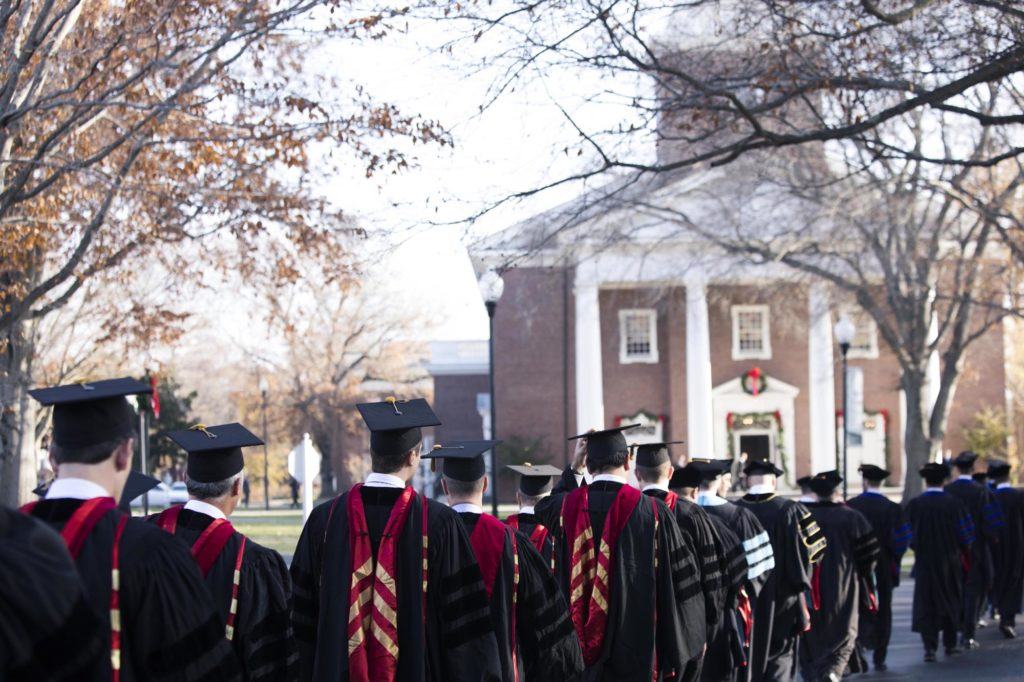
Editor’s note: October is Cooperative Program Emphasis Month in the Southern Baptist Convention.
NASHVILLE (BP) – Forty years ago, the Evangelical Theological Society (ETS) was a lonely place to be a Southern Baptist professor.
Southwestern Baptist Theological Seminary interim president David Dockery remembers being one of just four total Southern Baptists present at the 1983 meeting of ETS, a professional society for conservative biblical and theological scholars. Only two of those four taught at SBC seminaries.
“Evangelical scholarship was very limited at the time,” Dockery said, “and our engagement, as Southern Baptists, with the evangelical world was small.”
It’s a different story in 2022. Of the hundreds of presentations made at ETS’s annual meeting each year, more than a quarter are given by Southern Baptists – most of those by scholars with ties to SBC seminaries. At least five SBC seminary professors have served as ETS president, including Dockery. The increase of participation and leadership by faculty at the Convention’s six seminaries parallels a broader flowering of SBC scholarship over the past generation – funded by the Cooperative Program.
Southwestern, Gateway Seminary, Midwestern Baptist Theological Seminary, New Orleans Baptist Theological Seminary, Southeastern Baptist Theological Seminary and Southern Baptist Theological Seminary receive cumulatively more than $42 million in annual CP funds – distributed according to a formula that accounts for student enrollment among other factors.
Many SBC seminary professors “are capable of teaching at the highest level” at elite universities, Dockery said. “But they’re committed to the church first and foremost. They want to see their theology and their scholarship applied to the preparation of ministers.”
SBC seminary professors’ contribution to the broader realm of theological scholarship is substantial. In addition to their growing participation in ETS, SBC professors participate in other professional societies as well, including the Society of Biblical Literature and the American Academy of Religion. Jeffrey Bingham of Southwestern has served as president of the North American Patristics Society, which studies early Christianity. Bingham is editor of The Bible in Early Christianity, a series of books published by Brill, a European academic publisher.
Beyond their voluminous writing for the church, some SBC seminary professors have published books with major university and theological presses. Southwestern’s Gregory Wills has published twice through Oxford University Press. Midwestern’s Thomas Kidd also has published through Oxford in addition to half a dozen titles through Yale University Press.
Southern’s Tom Schreiner, regarded among the world’s top New Testament scholars, authored the volume on Romans in the Baker Exegetical Commentary on the New Testament. Southern’s Gregg Allison wrote “Historical Theology,” a nearly 800-page survey of how Christian doctrine developed, which serves as the companion volume to one of the world’s bestselling systematic theologies.
It’s not without sacrifice that such scholars teach at SBC seminaries. There is likely “a significant amount of money more” that can be made teaching at elite universities, Allison said. Another cost of teaching at an SBC seminary is lack of respect form non-evangelical colleagues. SBC seminary professors, even those atop their fields, often are dismissed or ignored by professors at secular universities – even though SBC professors interact with their secular colleagues’ work regularly.
When contacted by Baptist Press for a comment about some of the most accomplished SBC seminary professors, one Ivy League theologian replied, “I’d love to be able to write something, but alas I have not followed the work of SBC scholars, even those you mention, over the past 10 years. That is, of course, to my shame. But truthfully, so things stand.”
Yet the joy of SBC seminary teaching far outweighs any sacrifice. Money “never is an issue for us,” Allison said. “I’ve never heard in 20 years at Southern, ‘Gosh, if we were at Harvard or at Princeton, look how much more we could be making.’ We love where we’re at.”
Among the blessings of SBC seminaries, Allison said, are the ability to train Spirit-filled pastors and ministers, a supportive administration and having colleagues committed to The Baptist Faith and Message.
Teaching within the bounds of a confession of faith offers “great freedom,” said Midwestern Seminary provost Jason Duesing, “converse to how most think of higher education.”
“There are potential and real sacrifices, to be sure,” Duesing said of SBC seminary teaching, “but they are the same sacrifices anyone makes when seeking to serve in a ministry context – a worldly misunderstanding or critique, financial inequity, etc. – but the freedom and community camaraderie that comes is often seen as a worthwhile exchange.”
Best of all for Southern Baptist church members, CP-funded scholarship isn’t just fodder for academic discussion. It helps pastors, Sunday School teachers and discipleship trainers on a weekly basis.
SBC seminary professors provide “the resources for their pastors to prepare sermons,” Dockery said. “Their resources are behind the Sunday School lessons that are being written. Many of them are even willing to write some of those Sunday School lessons and Bible studies and small group” materials.
SBC professors, he said, “give credibility to conservative theological convictions.”

















